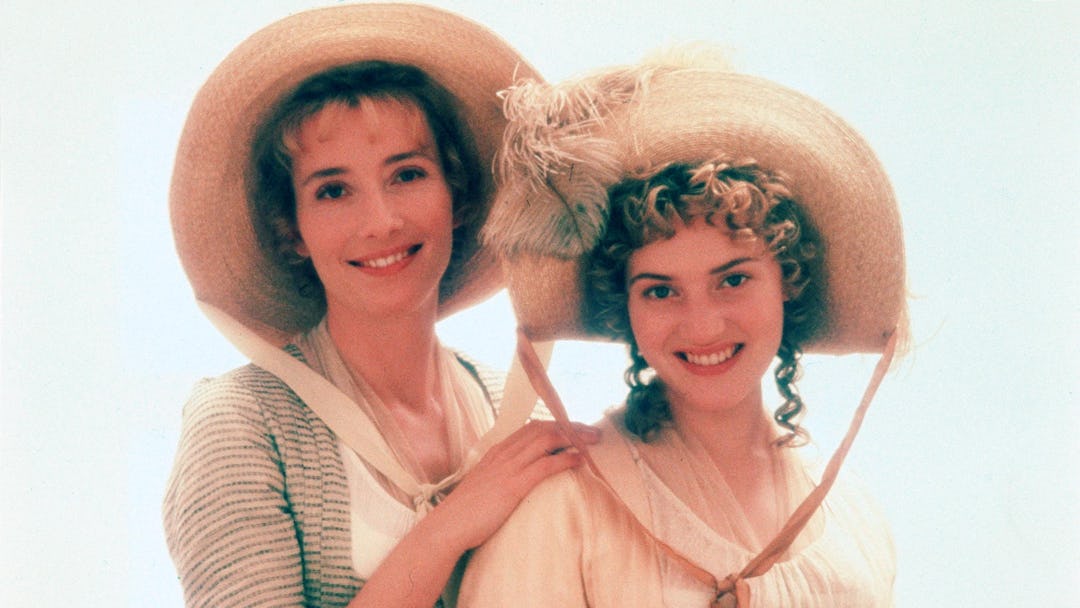“Is there any felicity in the world superior to this? …There’s some blue sky. Let us chase it!” Ask your average Jane Austen fan about this line, uttered by Marianne Dashwood in Emma Thompson and Ang Lee’s Sense and Sensibility adaptation, and they’ll admit it’s as memorable, and quotable as anything in the original novel.
Comparing anyone else’s writing to Austen’s is often considered a grave disservice by devotees of the author, but Thompson accomplished something quite remarkable with her Oscar-winning screenplay for Lee’s film, released 20 years ago this month. Thompson created her own sub-canon, an adaptation that is different from the novel’s vision but holds its own as a work of art. Personally I prefer other Austen adaptations qua adaptations, but as a movie that stands on its own, Sense and Sensibility will always be the pinnacle of Austen goes to Hollywood for me.
And it’s mostly because of the script, particularly Thompson’s treatment of Marianne, who was played by newcomer Kate Winslet (I still remember seeing “…and introducing Kate Winslet” in the trailer). In classic story of two sisters with two very different conceptions of romantic conduct and true love, Winslet plays the younger, more easily inflamed of the two. As the over-excitable heroine who so invested in capital-R Romantic (think Keats) notions, so much so that she exposes herself to ridicule and rejection, she is so gorgeous, and her character so unintentionally funny, that she becomes more sympathetic than she might be otherwise. The film makes Marianne’s follies and orthodoxies into cringe-comedy, Regency style, but with underlying pathos.
In the Austen novel, Marianne is such an object of satire that she inspires readers to want to chuck the book at the wall. The book is clearly partial to the perspective of older sister Elinor. But the film rounds Marianne out and makes her central to the plot, giving her lines so quotable that my friends and I still use them all the time, two decades later. There’s her riff on chasing blue skies above, and her admonishment of her sister for using unimaginative vocabulary for her own love interest, played by a stammering young Hugh Grant: “‘Esteem him? ‘Like him?’ Use those insipid words again and I shall leave the room this instant.” Or her delight at receiving wildflowers from a suitor who picked them from an “obliging field” after a previous suitor had offered more pedestrian blossoms: “These are not from the hothouse!” she says, clutching her new posies. And perhaps most oft-quoted among fans is Marianne’s dismissive concerns about her own health in the face of meeting her wildflower toting would-be hero, Willoughby: “What care I for colds when there is such a man?”
To which her eminently pragmatic sister replies, “You will care very much when your nose swells up.” At every stage of my life, I have had a girlfriend or two with whom I exchanged these lines, sometimes while one of us watches the movie and the other hangs on the phone, texting, g-chatting along with a production we know frame by frame. Thompson fundamentally understands the balance of humor and emotion that makes Austen so beloved, without tipping too much in either direction.
Critics of the adaptation think it turns a novel which is inherently anti-Romantic into something that’s more of an endorsement of the Romantic sensibility, especially with Lee’s trademark shots of sweeping landscapes as well as plenty of rainstorms and melancholy carriage rides. Eventually, Thompson’s composed, stately Elinor falls apart and weeps, revealing herself to have a volatile emotional core just like her sister. From that perspective, the film might be indeed said to deviate from Austen in endorsing Marianne’s sensibility over Elinor’s common sense. But repeat viewings reveal Marianne’s character to be every bit as naive (and irritating) as she is in the novel, and it’s really her growth that the film charts, just as the novel does. Elinor’s breakdown is an important moment onscreen, given more weight than in the novel, but it ultimately represents a small blip in her character’s arc. Meanwhile, Marianne’s final acknowledgment that she should have behaved more like her sister is the true lynchpin of the story. And her eventual acceptance of fangirl favorite Alan Rickman as a more calm and patient (but very romantic in his own way) match is certainly more palatable onscreen than in print, thanks to Rickman’s charisma.
But the core plot is not the only reason Austen fans love S&S95, as we call it in shorthand.There’s also the trivia: Thompson’s diaries from the shoot were published and are full of jokes about mud and menstrual cramps. Meanwhile the minor characters are perfection, most of the film’s eccentric British cast — including the perfect Hugh Laurie and Imedla Staunton as an ill-matched couple, Imogen Stubbs and Harriet Walter as nemeses of the Dashwood sisters who eventually, in an unforgettable scene, turn on each other. Many of the cast-members, in fact, went on to have roles as faculty at Hogwarts in the Harry Potter films, including Thompson, Alan Rickman, Gemma Jones, Staunton and Robert Hardy.
Finally, of course, Thompson met and fell in love with Greg Wise — who plays the dashing and caddish Willoughby — on set, and they’re still happily together (and let us pray that they never part). It’s the kind of well-balanced happy ending that makes Austen fans melt.
